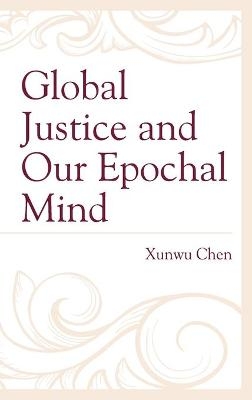
Global Justice and Our Epochal Mind
Seiten
2019
Lexington Books (Verlag)
978-1-4985-9633-6 (ISBN)
Lexington Books (Verlag)
978-1-4985-9633-6 (ISBN)
This book explores the mind of our epoch, defined as the period since the Nuremberg Trial and the establishment of the United Nations in 1945. It focuses on four central philosophical ideas of our time: global justice, cosmopolitanism, crimes against humanity, and cultural toleration.
Global Justice and the Mind of Our Epoch explores the mind of our epoch, defined as the period since the Nuremberg Trial and the establishment of the United Nations in 1945. Xunwu Chen examines four defining ideas of this epoch—global justice, cosmopolitanism, crimes against humanity, and cultural toleration—as well as the relationships among these ideas. Chen argues that the mind of our epoch is the mind of humanity. Its world view, horizon, standpoint, norms, standards, and vocabularies are all embodied in human institutions and practices throughout the globe. Furthermore, our epochal mind has a dialectical relationship with particular cultures and peoples, bearing normative force. As a metaphysical subjectivity and substance, humanity is the source of all human values and defines what can and should be human values and virtues. Humankind, therefore, is a people with socio-political and legal sovereignty, sharing a common fate. This novel study brings a cross-cultural approach and will be of great interest to students and scholars of philosophy, political science, sociology, and the humanities more broadly.
Global Justice and the Mind of Our Epoch explores the mind of our epoch, defined as the period since the Nuremberg Trial and the establishment of the United Nations in 1945. Xunwu Chen examines four defining ideas of this epoch—global justice, cosmopolitanism, crimes against humanity, and cultural toleration—as well as the relationships among these ideas. Chen argues that the mind of our epoch is the mind of humanity. Its world view, horizon, standpoint, norms, standards, and vocabularies are all embodied in human institutions and practices throughout the globe. Furthermore, our epochal mind has a dialectical relationship with particular cultures and peoples, bearing normative force. As a metaphysical subjectivity and substance, humanity is the source of all human values and defines what can and should be human values and virtues. Humankind, therefore, is a people with socio-political and legal sovereignty, sharing a common fate. This novel study brings a cross-cultural approach and will be of great interest to students and scholars of philosophy, political science, sociology, and the humanities more broadly.
Xunwu Chen is professor of philosophy in the Department of Philosophy & Classics at the University of Texas at San Antonio.
Introduction: The Mind of Our Time
Chapter One: Global Justice
Chapter Two: Cosmopolitanism
Chapter Three: Crimes against Humanity
Chapter Four: Toleration and Global Justice
Conclusion
Bibliography
About the Author
| Erscheinungsdatum | 10.05.2021 |
|---|---|
| Verlagsort | Lanham, MD |
| Sprache | englisch |
| Maße | 164 x 232 mm |
| Gewicht | 590 g |
| Themenwelt | Geisteswissenschaften ► Philosophie ► Geschichte der Philosophie |
| Geisteswissenschaften ► Philosophie ► Philosophie des Mittelalters | |
| Geisteswissenschaften ► Religion / Theologie | |
| Sozialwissenschaften ► Politik / Verwaltung ► Politische Systeme | |
| Sozialwissenschaften ► Politik / Verwaltung ► Staat / Verwaltung | |
| ISBN-10 | 1-4985-9633-9 / 1498596339 |
| ISBN-13 | 978-1-4985-9633-6 / 9781498596336 |
| Zustand | Neuware |
| Haben Sie eine Frage zum Produkt? |
Mehr entdecken
aus dem Bereich
aus dem Bereich
die kolonialen Wurzeln der französischen Theorie
Buch | Hardcover (2024)
Matthes & Seitz Berlin (Verlag)
28,00 €
eine Geschichte der Zuversicht von Homer bis zum Klimawandel
Buch | Hardcover (2024)
C.H.Beck (Verlag)
28,00 €


